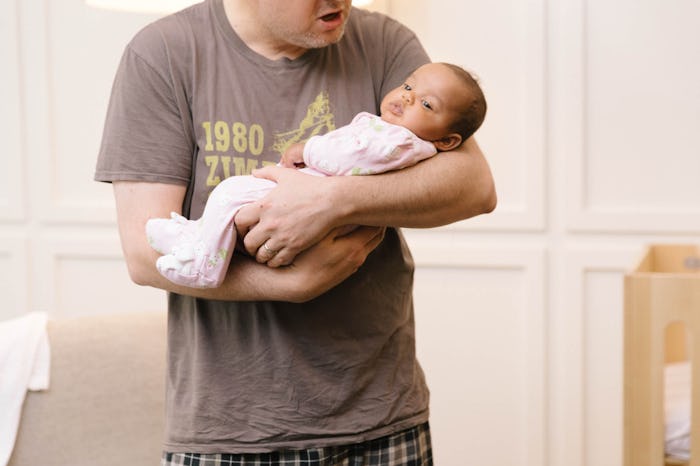It was 95 degrees Fahrenheit last week in Brooklyn and I was schvitzing. I was also considering the legality of public nudity because stripping sounded great since it was so hot. Babies can be naked, why not me? But it turns out, babies process heat differently, which is why knowing what to do if your baby is overheated is an important bit of knowledge every parent should have.
Babies are not great at thermoregulation. They are very sensitive to cold and heat, and because of that, their little bodies tend to overcompensate, according to Neonatology. They are more likely to experience hypothermia or heat exhaustion and heat stroke than older children and adults because they simply don't have the body mass to deal with heat as effectively. (Note: this is also true for the elderly, so please check on your grandparents and elderly neighbors. Elderly people do not feel heat the same way that younger adults do, an article in the U.S. National Library of Medicine noted, leading many to assume they're not as hot as they are.)
Heat can be a dangerous beast, and you want to make sure you know what to do if your baby is overheated. First, if your baby is worrying you at all, call your doctor, but if you see any of the major signs of heat stroke or heat exhaustion, such as a listless baby with a temperature of 105 degrees Fahrenheit or over (rectally), call 911, recommended Seattle Children's Hospital. If your baby is simply beginning to overheat, however, most often it can be treated at home.
Gina Grnach, an emergency room director and registered nurse in San Antonio, Texas, tells Romper that you should move your baby into a cooler place immediately. Get them out of their hot clothing, and give them fluids. "You don't need to take off their diaper, just open it, but get them out of the clothes they're wearing." She says the most important thing is just to keep them in the cooler environment and hydrated until the heat dissipates. "But don't let them get so cool that they shiver." If your baby is cooling pretty quickly, let them keep some light clothing or a muslin on to prevent them from becoming too cool.
In the case of heat, an ounce of prevention is worth a pound of cure, found the American Academy of Pediatrics. Their website, HealthyChildren.org, strongly warned parents against having your children in situations where they might become rapidly overheated, and always having a cool place to retire to if necessary, like an air conditioned library or shopping mall, if your home doesn't have air conditioning.
Overheating is easier to prevent than treat, but it's not always a perfect world. Remember that with clothing, lighter colors are cooler, and all-natural, loose fitting fabrics are better. Keep baby inside during the hottest part of the day, well-hydrated, fit them with a wide-brimmed hat for shade, and always keep a close eye on your little one to monitor their health and behavior. If you're ever concerned that your baby's heat exhaustion has gone too far, don't hesitate to seek medical attention.
